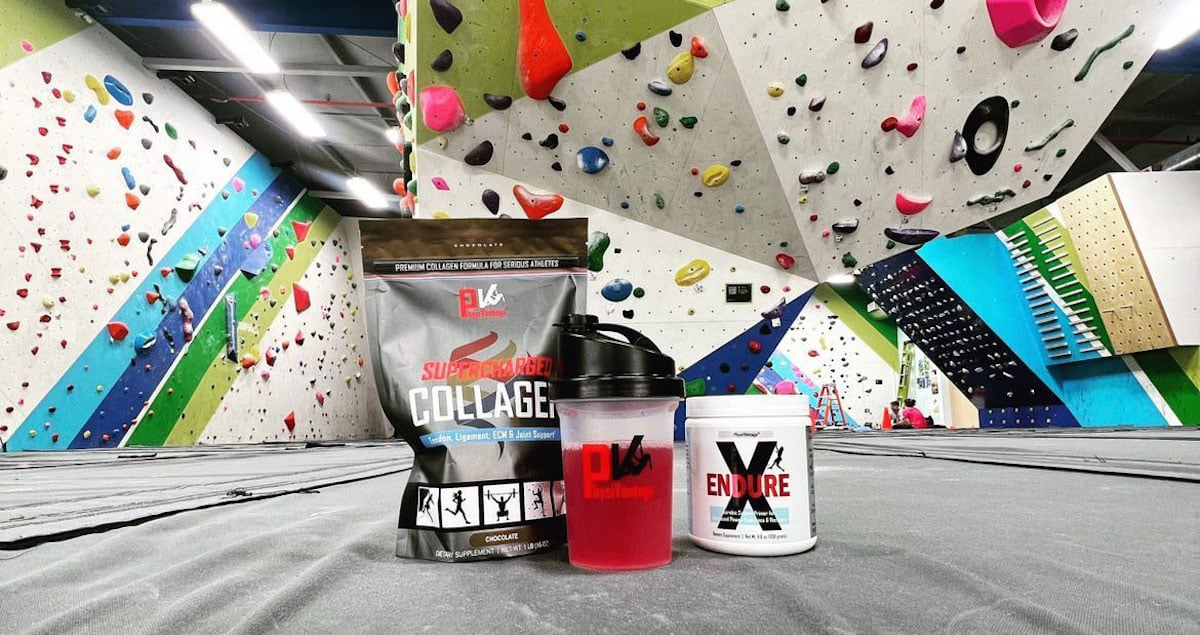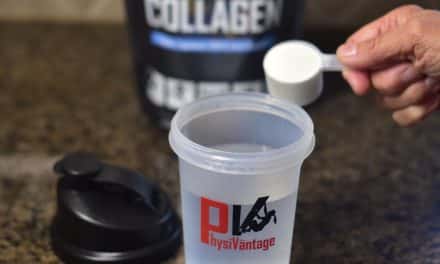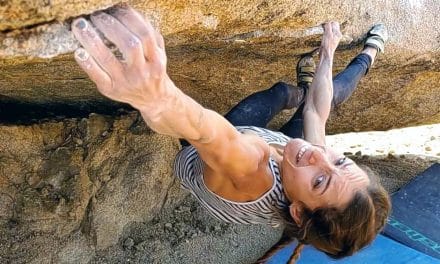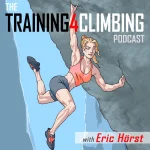Routesetting is both a physically and mentally taxing job. To keep up with the heavy workload, you need to fuel yourself right. That means eating well, enough, and often for a steady stream of energy. Learn how to navigate nutrition as a routesetter.
This is the third in a three-part series on self-care for routesetters. Head back to the first segment for an introduction to common pain points among routesetters and tips on strength training and injury prevention, then to the second on fitting in your own training for climbing as a routesetter.
A day in the life of a routesetter looks pretty different from your typical desk job. You’re on the move from the moment you walk in the door of the gym to the moment you leave. Not only that, you’re doing hard manual labor pretty much that entire time: jugging up ropes, climbing ladders, lifting holds, lugging volumes, using power tools, fixing t-nuts, and more—all before you even pull on your climbing shoes and put your work to the test.
It’s not as easy as just checking the boxes either. You can’t drag your feet, slap up some holds, and call it good. Routesetting requires creativity and intentionality. That’s hard to do without enough gas in the tank. Nutrition, then, is just as much a part of the job as any hard skill.
#3: Nutrition

A blank canvas means one thing: a long day’s work ahead! Fuel yourself well to keep up with the workload.
All of that effort requires a ton of energy. Like a marathoner who skimps on gels, you’ll bonk before you cross the finish line if you don’t fill up the tank faster than you drain it. Getting enough fuel throughout the day is key to creating your best work on the wall. And if you’re stacking your own training on top of that, it’s even more important to keep up with your nutritional intake.
But eating enough is only part of the equation. What you eat, how often you eat, and what kinds of supplements you take all have an impact as well. Approach your nutrition wisely to power through each shift with ease; wing it and risk running on fumes instead.
Eat Enough
Some of the best advice I’ve heard for hardworking athletes comes from elite running coach David Roche: “Eat enough, always. Eat too much, sometimes. Eat too little, never.” These instructions aren’t exclusive to endurance athletes. Climbers need full energy stores too. Hungry muscles can’t fire, grow, or recover. And if everyday climbers require plenty of energy at their disposal, routesetters could use even more. Climbing on its own is plenty taxing; tack on regular setting duties for a metabolism that rages like a bonfire. I remember coming home from a day of setting as a newbie on the job and feeling like I was about to pass out from hunger, despite eating as much as I could during the day. The energy expenditure adds up fast.
Ben Rathbun, former head setter at Eagle Climbing + Fitness and part of the Monkeyhouse Carbondale setting team, suggests thinking of work days like long days at the crag. “I try to eat just like I would for a hard outdoor climbing day,” he explains. “Regular meals, with snacks in between, so that I’m supplying myself with a steady stream of energy the entire time.”
He knows that his productivity levels plummet as soon as his energy begins to wane. “On days that I don’t fuel properly, I’m a bad setter,” says Rathbun. Prepping for a successful work day means loading up his bag with appetizing options that are easy to grab and go. Even once the work day is over, nutrition remains important. “I make sure to wrap up the day with a substantial meal, so that I can fill in any gaps I missed and set a good foundation for the next day.”
Don’t be afraid to listen to your hunger. It’s normal to need more fuel every couple of hours, especially when you’re expending so much energy at every turn. Pay attention to typical hunger cues like a growling in your stomach, but know that other symptoms like lightheadedness, difficulty focusing, poor sleep, and fatigue are also signs of low energy intake. Respond to them all with the food your body is asking for!
Eat Well
Eating enough is most important. Eating well comes in at close second. Filling up on salad won’t give you nearly enough energy for the day, but neither will donuts for every meal. The right balance of nutrients for busy routesetters lies somewhere in the middle.
Carbohydrates are the body’s preferred source of quick fuel. So, it makes sense to include a source of carbs every time you chow down. Simple carbohydrates, like white grains and fruit, provide energy the fastest. Complex carbohydrates, such as whole grains and sweet potatoes, provide more slow-burning energy. Both help fuel you up for a long day’s work, but simply carbs are your best bet when you need to spark the fire stat. Yes, the very foods that get a bad rap for being “processed” and “bad” are actually a smart way to fuel during a fast-paced setting shift! Bring along easy-to-eat snacks like crackers, trail mix, sports chews, and fruit to munch on throughout the day. Then, build each meal around more complex carbohydrates packed with fiber to keep that fire burning.
Protein deserves your attention too. As we break down our muscles through hard physical labor, protein helps them rebuild—and come back stronger to boot. Balancing carbs with protein also helps maintain stable blood sugar levels. Cheeses, dried meats, hard-boiled eggs, nut butters, hummus, and edamame all make perfectly portable protein options that pair well with the carb suggestions above.
Consider finishing each day with a protein-rich evening snack. According to sports dietitian Kylee Van Horn of FlyNutrition, protein before bed aids with recovery to make sure you’re able to start the next day on the right foot. Greek yogurt, cottage cheese, and Kodiak Cakes flapjack cups are some of my go-tos that pack a protein punch (and appeal to my nighttime sweet tooth!).
Fill in the Gaps
Sometimes it’s impossible to meet your high energy needs as a routesetter with whole foods alone. That’s ok! As long as you’re including plenty of quality vitamins and minerals from a variety of colorful foods in your diet, supplements can help fill the gaps. Supplements can be especially helpful for busy routesetters because they’re convenient, condensed, and easily digestible.
But don’t trust any old supplement off the shelf. As a routesetter, your body is your most valuable tool. Plenty of supplements out there don’t go through any sort of vetting process to ensure their quality. The cost to your health—and your wallet— isn’t worth the arduous process of weeding out the shams. Luckily, PhysiVāntage Nutrition cuts to the chase with science-based, research-backed supplements designed specifically for climbers.
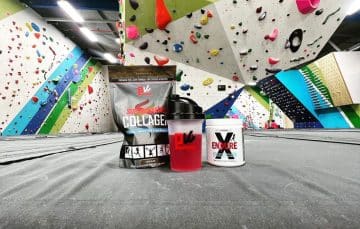
Fill in any gaps in your nutrition with safe, reputable supplements.
Whey and plant-based protein powders from PhysiVāntage make it much easier to hit your protein quotas for optimal recovery from day to day. Bring a scoop in a shaker bottle with you to work so you can slam a quick serving of protein as soon as you wrap up for the day to kickstart the recovery process. Even better, pair that protein with a carb to refill your glycogen stores too. I like to mix a scoop of protein powder with a cup of Cheerios in a to-go container, then add water right before eating for a yummy bowl of protein-packed cereal.
Before your shift, set your precious tendons up for success with a preemptive dose of collagen. Daily jugging, rigging, and lifting makes setters especially susceptible to overuse injuries in the tendons. Collagen strengthens connective tissues for reduced injury risk under all that wear and tear. The PhysiVāntage blend features grass-fed, pasture-raised, non-GMO hydrolyzed collagen plus Vitamin C for activation and the full spectrum of amino acids to make it a complete protein. I go for a scoop of the vanilla or chocolate flavors in my morning oatmeal.
Caffeine can also be a very powerful supplement for routesetters. No matter how well you fuel, those hours still add up. Pre-workout supplements like Crush take all the benefits of caffeine as a performance enhancer while nixing the more frustrating side-effects for climbers like jitteriness and vasoconstriction. A capsule or two at lunch between setting and forerunning makes an ideal midday reboot.
Finally, at the end of each long day, consider adding a dose of Redux to your evening snack. It’s easy to pop a few Ibuprofen to take the edge off, but chronic NSAID use comes with some scary ramifications. Tart cherry, turmeric, and ginger are nature’s anti-inflammatory. Combined with the protein from your food, these help your body bounce back in time to do it all again tomorrow.
(PhysiVantage offers professional setters and other gym employees Pro Deal pricing! Head here to apply.)
Key Points:
- Eat enough. Consider food prep an essential part of your work day. Punctuate the day with regular meals, with snacks in between every two to three hours for a steady stream of energy. Give your body the respect it deserves by giving it enough energy to work with.
- Eat well. Prioritize carbohydrates for energy. Simple carbs provide the quickest boost, while complex carbs burn slowly throughout the day. Combine the two for both immediate and sustainable energy. Pair your carbohydrates with protein to stabilize blood sugar levels and to promote recovery.
- Fill in the gaps in your nutrition with supplements. But be careful which ones you trust. Go for science-based, research-backed brands like PhysiVāntage Nutrition so you know what you’re getting and how it benefits you. Weapons Grade Whey or Powerplex plant-based protein aids with recovery, collagen safeguards your connective tissues, Crush psychs you up for the day ahead, and Redux helps you bounce back.
Copyright 2023 Eric Hörst | Horst Training, LLC.

